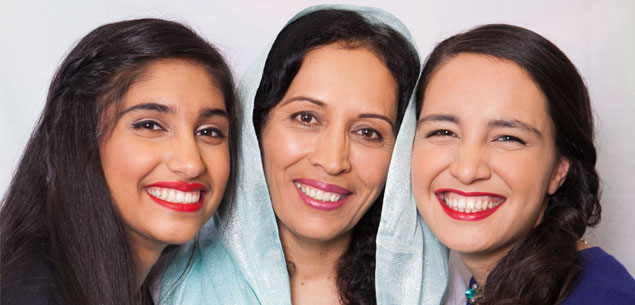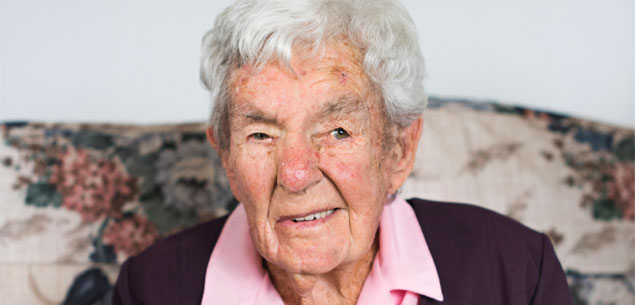In a small community centre in Auckland, mothers and daughters are gathering for a special pamper day. As they stream through the door, some say hello and others just smile shyly – while they’ve all arrived in their new home country as refugees, they’re all at different stages of their emotional journey.
The day has been run by Refugees As Survivors – and the organiser Fahima Saeid is there to offer a hand and a smile, as the women sit down to have their nails painted and hair done. She knows all too well what they’re going through, having arrived in New Zealand as a refugee herself 15 years ago.
Fahima Saeid (50), Naheed (19) and Tamkeen (16)

Fahima’s daughters Tamkeen (left) and Naheed admire their brave mother for the huge sacrifices she’s made for them.
In Afghanistan, Fahima was working as a doctor, seeing up to 100 female patients for the organisation Doctors Without Borders until the ongoing violence forced her and her young family to seek refuge in Pakistan. Unable to work, her husband, who is also a doctor, left for New Zealand to secure residency for the family while she stayed and looked after their three small children. A year later she arrived here, hoping to work in the same profession. But she found becoming qualified in New Zealand would be a long and expensive process.
“I couldn’t believe it, I was in shock,” says Fahima. “I felt like a prisoner, sitting at home looking after the children, because I had loved my job. I’m a people-person and helping is my passion.”
Being a stay-at-home mum in a new country had its own challenges. On a few stormy nights, as her husband worked and her children slept – she was huddled in the corner of her two-storey house as it shook, terrifed it was going to fall down. A phone ringing would send her into a panic because while she knew some English, understanding the New Zealand accent was another matter. And, no one visited, which left her feeling lonely.

The beautiful Saeid women enjoyed a fun day of pampering with a hair and make-up expert.
“New Zealand is a lovely place, but in Afghanistan, when you moved to a new street, the neighbours would knock on the door, they would know we needed to unpack, they would bring food. But here, after three or four months, I hadn’t met any of the neighbours. They were nice people but they were just working. They didn’t know I was crying and getting emotional with the children and missing my family and my job,” the mother-of-four admits.
Fahima’s two daughters are very proud of their mother – who retrained as an advocate counsellor and now works with refugee mothers and children to improve their health and wellbeing. She also runs weekend groups to boost their self-esteem.

Fahima now works with refugee mothers and children to improve their health and wellbeing.
“Our parents are very brave to give up their jobs, which they spent a long time studying for. They did that so we could get an education,” says Naheed (19).
“I don’t think we’ll ever be able to understand just what it took,” adds Tamkeen (16).
The sisters also have two brothers, Naveed (21) and Tameem (13), and admit they put extra effort into their school work so that their parents’ struggle wasn’t in vain.
“One of the questions my friends ask me is ‘Why don’t you wear a headscarf?’
I personally don’t think I have to because it’s not necessary here,” Naheed says.
But trying to deal with the negative stereotyping is hard and the sisters say it’s something they often talk about at home.
“While I’ve never faced anything bad here, it’s difficult to present yourself as being Muslim, when there’s always the chance that someone might have a preconceived idea of what a Muslim is,” says Tamkeen.
“A lot of people assume because I’m Muslim, I support all the bad things extremists are doing. It’s really hard to deal with, because I know I’m not like that and I don’t condone what they’ve done,” adds Naheed.
Fakhria Sarifi (37) and Summer (16)

Fakhria was pregnant with Summer, who is now 16, when she and her husband sought refuge in this country.
Fakhria Sharifi’s smile as she puts her arm around her daughter Summer, is very different from the expressions she wore the day she arrived here as an asylum seeker. She’s now a cross cultural worker for the Red Cross – but when she arrived 16 years ago she was newly married and pregnant. Her first impression of what New Zealanders were like came when she met a disgruntled translator.
“She was missing her daughter’s birthday party and I felt bad about that. But when I asked her where we should go, she snapped, ‘You found your own way when you lived back home, go and find your way here too!’ I started crying and went back to immigration, and begged them, ‘Please, please send us back to our country.’ I thought everybody was going to be that rude,” she recalls.
Their first two weeks in our country were spent sleeping on the musty carpet of a damp rental house, without any pillows or blankets. With no idea where to shop for halal meat or how to use the transport system, all the couple ate were bags of chips. And while most Kiwi first-time mums have a wealth of information on hand during their pregnancies, young Fakhria had no idea about midwives or Plunket – only learning of her entitlements a month before she gave birth.

Fakhria returned to Afghanistan 10 years ago, only to find the violence had become much worse.
But whatever barriers Fakhria encountered during those first few years, they pale in comparison to what her family’s life would have been like in Afghanistan under constant threat from the Taliban.
“If your hair showed from out of your burka, they’d shoot you. I lost friends and my husband lost three of his brothers. One brother died in a bomb attack – and all we had was a piece from a body,” she recalls.
The family saw for themselves just how bad the violence had become 10 years ago, when they went back to Afghanistan to be closer to Fakhria’s sick mother-in-law. Fakhria believed her children – Summer, who was then six years old, one-year-old Hashir and Shabir, who was 14 weeks old – would be safe because the family’s house was close to an army base. But they were back on a plane within six months.
“There’d be a bomb and the other children would just keep playing. My daughter would ask me, ‘What happened? There is a body – there is blood.’ After that, I said to my husband, ‘We cannot stay here’.”

In Afghanistan under the Taliban, Summer’s hair would have to be hidden by a burka.
Fakhria’s heart is full of pride when she looks at Summer, who is now 16 and studying at Auckland Girls’ Grammar. The teenager, who hopes to become a doctor, can’t remember the six months she spent in her homeland. But she was amazed to find a video on the internet of Afghanistan in the 1970s before the Taliban took hold.
“The women were wearing short skirts. There was no war, and people weren’t worrying. Everyone was happy.”
It’s something that would surprise her schoolfriends – who are often full of questions about what it means to be Muslim. “Some of my classmates understand, others don’t, they just think it’s all about people dying and bombs. But it’s not – it’s about family.”
World Refugee Day is on June 20
Refugees As Survivors helps traumatised refugees bridge the gap between the danger and suffering of their old life and their bright new futures in New Zealand.
For information or to donate, visit rasnz.co.nz.
Words by: Anastasia Hedge


